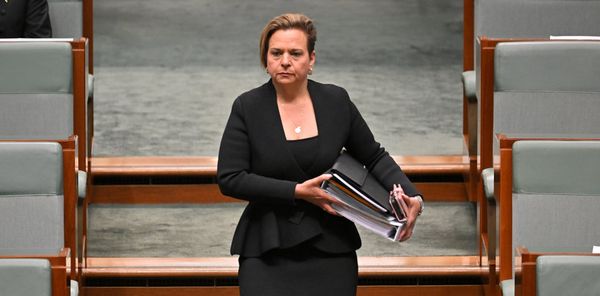As part of his presentation on the 10-year plan for the NHS, the prime minister promised the nation “a doctor in your pocket”. It was an all-too-rare example of the government offering the public a tangible, and significant, improvement in the quality of their individual and collective lives. Rather than the depressing routine of being bombarded with tax hikes and cuts to services and the welfare state, here is something – a greatly enhanced NHS app for smartphones – that the voters can actually look forward to.
Sir Keir Starmer, flanked by a more confident-looking Rachel Reeves, declared that, under the plan, everyone will have the opportunity to use their smartphones or tablets to book appointments online, have access to 24/7 health advice, order repeat prescriptions, review their own medical records, and be given guidance to approach charities and companies that may supply more help. It would indeed be transformative, part of the long-overdue NHS transition from analogue to digital systems.
If all goes well, the NHS will transform from a service with fax machines in its clinical offices to a world leader in the application of artificial intelligence to boost productivity and save lives. Indeed, in reviewing scan results, AI is already proving its worth. For these reasons and more, the government's NHS plan deserves a cautious welcome.
Sir Keir was graceful enough to say that none of the extra resources flowing into the service would be there were it not for the decisions that his chancellor had taken. No one can deny that Ms Reeves made some serious errors of judgement in her first year in post, but she has also tried to rebalance the economy towards investment and put the public finances on a more sustainable footing. That her backbench colleagues sometimes blocked her is not entirely her fault. There is still, after all, such a thing as collective cabinet responsibility, and neither Ms Reeves nor Liz Kendall at the Department for Work and Pensions deserves to be scapegoated. Her private life should be respected.
The welfare bill fiasco stands in stark contrast to the government’s NHS reforms. The changes to sickness and disability benefits were essentially small-scale reforms, affecting, at most, £5bn out of a total social security budget of more than £300bn. The bill was also marred by being perceived, with reason, as a rushed attempt to plug a hole in the public finances – something Ms Reeves can be fairly criticised over.
The rest of the social security sector, not least the state pension and its “triple lock”, was untouched by the welfare bill, entirely unrealistically, as was the tangle of other, in-work benefits within the universal credit system. There was no attempt and no time to “roll the pitch” in policy terms, nor to carry the parliamentary Labour Party. Failure was almost preordained, and blame should be shared by all those involved.
By comparison, the NHS reforms are, thus far, a model of public policy-making and political communication – and done at speed. Within a few weeks of taking office last year, the new health and social care secretary, Wes Streeting, commissioned the distinguished surgeon and health expert Lord Darzi to report on the state of the NHS. By September, he had reported, and in the spring, Mr Streeting announced the abolition of NHS England, which duplicated too much of the work of his department.
Now, just within the first year of office, we have the 10-year plan: a long-term, comprehensive strategy, at least for England (health policy being a largely devolved matter). In medical terms, this 77-year-old patient, the NHS, has undergone a thorough examination, has been prescribed medicine, and has a treatment plan and, hopefully, the resources, skilled staff and industrial peace it needs to restore it to full vigour.
Of course, Mr Streeting has the great advantage over Ms Kendall, and almost all his other colleagues, in that he is managing a real-terms increase in resources, rather than cuts and austerity. But, then again, an ageing population and advances in drugs, some expensive, will always pile on the pressure on the NHS. For that reason, Mr Streeting is wise to place preventative medicine at the forefront of his reforms.
Prospectively, Mr Streeting will be the first health secretary to shift the traditional focus of the NHS on treatment towards prevention instead – public health measures (such as vaccine uptake), the promotion of lifestyle and dietary changes, and cancer screenings can save lives and huge amounts of money in the longer term – and the NHS will be less of a “national sickness service”. With the expansion of free school meals, breakfast clubs and better access to dentistry, a marked improvement in the wellbeing of the nation’s children should follow. The previous government’s long-term staffing plan, launched in 2023, will be retained but amended to make use of more staff trained in the UK.
The move towards a “neighbourhood health service” is also worthy of guarded praise. Purpose-built, multi-disciplinary “drop-in" clinics with family-friendly opening hours sound like a fine idea for people to be able to access help, rapid tests and minor procedures. These clinics should take some of the strain off A&E departments – too often a first point of triage for non-emergency cases – as well as GP surgeries. Nonetheless, the GP service still has much to offer, provided patients can actually get an appointment; in any case, there will probably never be enough neighbourhood centres to replace experienced general practitioners.
Reform of the NHS is essential for the good of the country. Politically, it is the most critical of all for the future of the government. Already, there are tentative signs that more resources are improving the service – more appointments, for example – and the public should, in due course, give the government the credit for that.
But this is, to borrow a phrase, only the end of the beginning of a long journey of reform and modernisation. Mr Streeting has a difficult job ahead, especially in carrying the trade unions and professional bodies with him. He shows every sign that he understands the nature of the task – and the stakes.
If the NHS is not delivering what the voters expect of it by the time of the next election, then they will start looking for second opinions and alternatives. If Mr Streeting fails, that would be the ultimate betrayal of the trust the British people placed in the Labour Party only one year ago.







